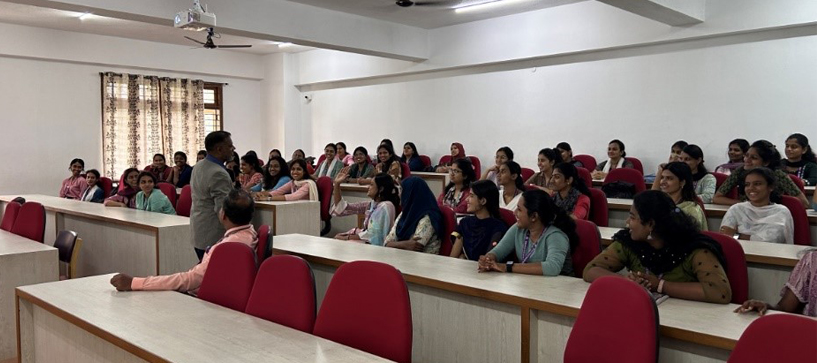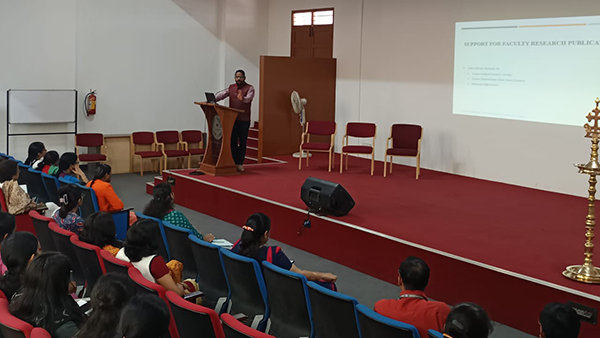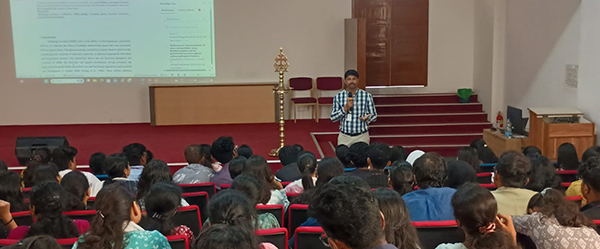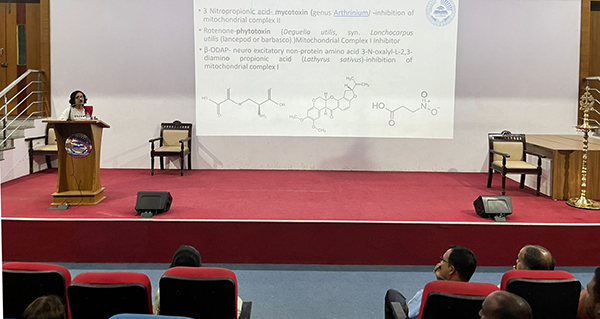
Guest Lecture
Exploring the Research Ecosystem at KJU
Date: 09 August 2025
The School of Biological and Forensic Sciences at Kristu Jayanti University held its Monthly Research Day on August 9, 2025, with the theme “Exploring the Research Ecosystem at KJU.” The session was led by Dr. Dileep Francis, Dean of Research & Development, who delivered a Research Empowerment Talk focused on promoting a deeper understanding of research culture among students and faculty. The program began at 9:00 AM, with Dr. Francis explaining the importance of building a strong research ecosystem, highlighting institutional facilities, collaborative opportunities, and strategies to enhance research productivity and publications. His speech emphasized interdisciplinary research, ethical practices, and the importance of publishing in reputable journals. He also stressed the significance of publishing a research paper in a SCIE-indexed journal. Faculty members from Life Sciences and Forensic Sciences actively participated, gaining valuable insights into the university’s research framework and available resources. The session served as a vital platform to motivate and guide the academic community toward innovative, impactful, and ethically sound research practices. It effectively raised awareness of research opportunities and support systems at Kristu Jayanti University, paving the way for greater scholarly contributions.

Writing A Review Paper: Crafting Scientific Narratives
Date: 06 August 2025
A special session on Review Paper Writing and Structure in Life Sciences provided a clear and focused overview of training conducted for students in Biotechnology, Microbiology, and Biochemistry. The goal—to improve scientific writing skills—aligned well with the academic and professional needs of life science graduates, making it both relevant and timely. The report highlights key points covered by the resource persons, emphasizing the role of review articles in summarizing research, identifying knowledge gaps, and suggesting future directions. Introducing different review types—narrative, systematic, and meta-analysis—added depth, reflecting the session’s thoroughness. A major strength was the explanation of the standard review paper format (Title, Abstract, Keywords, Introduction, Thematic Main Body, Conclusion, and References), which offers a clear guide for structuring manuscripts. The focus on clarity, critical analysis, and proper citation showed that the session promoted both technical writing skills and intellectual rigor. The inclusion of ethical considerations, especially plagiarism avoidance, underscored the importance of scientific integrity. The session also encouraged the use of modern tools such as Mendeley for reference management, BioRender for creating scientific illustrations, and Grammarly for language refinement, promoting efficiency and professionalism. While the report effectively summarizes the core content, it could be further improved by including participant feedback, session duration, qualifications of the speakers, and examples of interactive elements like writing exercises or peer review. Overall, the session was a well-designed academic initiative that equipped life science students with both conceptual understanding and practical tools, ensuring skills that extend beyond the classroom and contribute meaningfully to scholarly literature.

Monthly Research Day - Research Empowerment Talk
Date: 26 July 2025
The School of Biological and Forensic Sciences organized its 1st Monthly Research Day on 26th July 2025 with a focus on fostering research awareness and interdisciplinary learning. The event featured a Research Empowerment Talk delivered by Dr. Shinomol George K, PhD, Assistant Professor, Department of Life Sciences, Kristu Jayanti University. The session, titled “Neurotoxicology of Mitochondria to Environmental Toxicology,” explored the intricate relationship between mitochondrial function, neurotoxic effects, and environmental toxicology. Dr. Shinomol highlighted the significance of mitochondria in maintaining neural health, the mechanisms through which environmental toxins disrupt mitochondrial function, and the broader implications for human health and ecological systems. The talk offered valuable insights into emerging research areas, integrating concepts from molecular biology, neuroscience, and environmental science. Participants gained a deeper understanding of the importance of mitochondrial health in preventing neurodegenerative diseases and mitigating environmental toxin impacts. The program successfully achieved its objective of motivating students and faculty to engage in interdisciplinary research and to explore innovative solutions to pressing health and environmental challenges.


